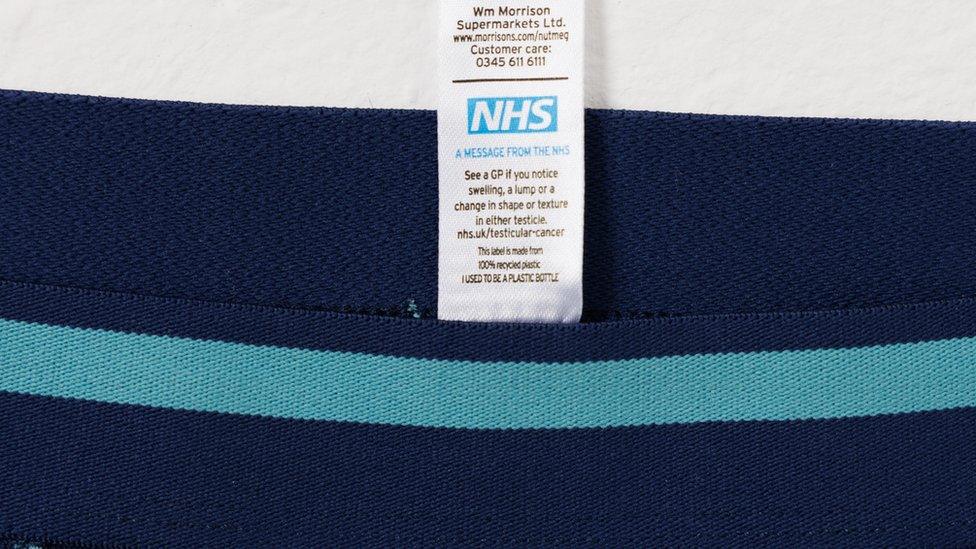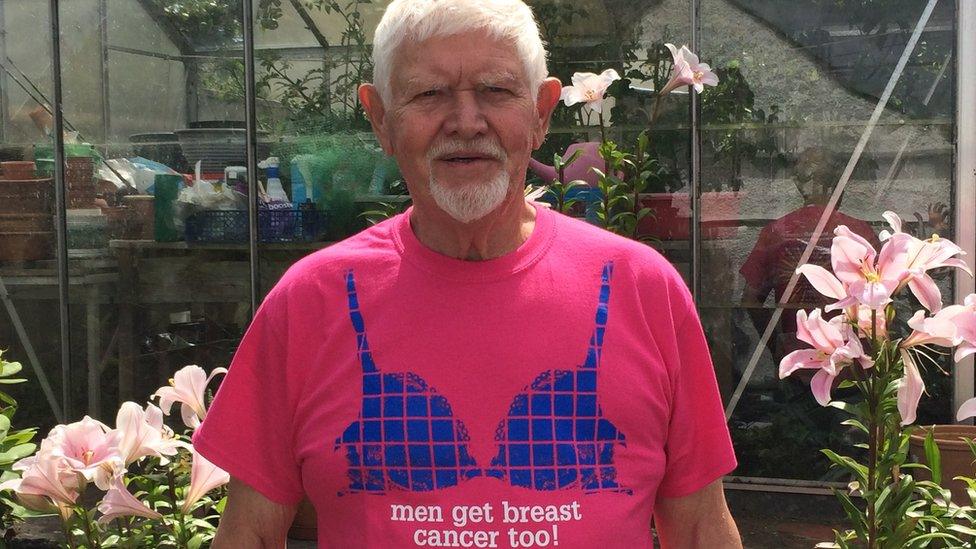Morrisons' bras and pants carry NHS cancer check label
- Published

The NHS has teamed up with Morrisons supermarket to put extra labels in underwear reminding people to see their GP if they spot potential symptoms of breast or testicular cancer.
People should look out for lumps and bumps or "anything unusual".
The Nutmeg-branded boxer shorts and crop-top bras will be in 240 stores in England in the coming months.
A QR code on the packaging and tags directs customers to more detailed health information on the NHS website.
Symptoms of breast cancer can include a lump or change in the look, shape or feel of one or both breasts. Although rarer than in women, men can get breast cancer too.
Testicular cancer may present as a painless swelling or a lump in one of the testicles or any change in shape or texture of the testicles. Not all lumps will be cancer, but they need checking out.
NHS England's National Director for Cancer, Dame Cally Palmer, said: "This is the first time the whole of the NHS has worked with a national supermarket brand to put health messaging on clothing, with the aim of encouraging thousands more people to be body aware, so they can spot new or unexplained changes that might be cancer symptoms early, and contact their GP practice for checks if concerned.
"Cancer survival is at an all-time high - survival for both breast and testicular cancers has improved significantly over the last 50 years and we're seeing more people than ever before diagnosed at an early stage - and this partnership with Morrisons is just one of the many ways we are ensuring people are aware of potential cancer symptoms.
"I want to urge everyone to be aware of their own bodies - please look out for lumps and bumps or anything else that is unusual for you - and get checked out early. It could save your life."

Edward Solly has gone from testicular cancer diagnosis to cancer awareness campaign model
Former Morrisons employee Edward Solly, who is 35 and from Kent, has modelled for the new range of underwear.
He was diagnosed with testicular cancer in his 20s after seeing a doctor for an unrelated sports injury. Scans, tests and a biopsy revealed there was a cancerous mass and that it had already progressed to his abdomen.
He is cancer-free thanks to surgery and chemotherapy, and he now spends a lot of his free time giving talks to boys in schools about the importance of checking yourself: "As a cancer survivor myself, I know that a daily reminder to be body aware really could save your life … who knew a pair of undies could hold so much power?"
Testicular cancer
Around 2,300 men are diagnosed with testicular cancer each year in the UK.
Although it is relatively uncommon overall, it is the most common type of cancer to affect men between the ages of 15 and 49.
With treatment, nearly all men can survive testicular cancer.
To find out more visit the NHS website, external.
How to check your testicles
A good time to check your testicles is after a warm bath or shower, when the skin is relaxed
Cup your hand under them and check for swelling and lumps
Roll each testicle between your finger and thumb and feel the weight
The NHS says most men's testicles are around the same size, although it is common for one to be slightly bigger than the other or hang lower
The testicles should feel smooth, without any lumps or bumps, and firm but not hard. You may feel a soft tube at the back of each testicle, which is called the epididymis - this is entirely normal
There might be something wrong though, if you find a hard lump on the front or side of a testicle, a testicle is swollen or if there's pain or discomfort in a testicle or in the scrotum (the sack that holds the testicles)
If you notice any changes or anything unusual about your testicles, you should see a GP
Source: NHS, external

Sign up for our morning newsletter and get BBC News in your inbox.

Related topics
- Published9 January 2019

- Published14 August 2020

- Published17 October 2021
